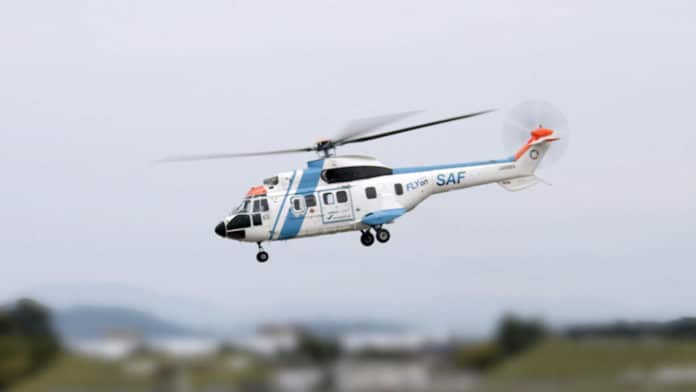Airbus Helicopters in Japan and Nakanihon Air (NNK), Japan’s leading helicopter operator, have jointly performed the country’s first-ever helicopter flight powered by sustainable aviation fuel (SAF). NNK’s H215 helicopter conducted a 30-minute flight at Nagoya Airport in Aichi Prefecture.
The aircraft was fueled with 600 liters of “SUSTEO 10”, a renewable jet fuel produced by Japan’s first biofuel manufacturer Euglena. SUSTEO contains 10% SAF mixed with Jet A-1.
Four-bladed, twin-engine, heavy-lift H215 helicopter is a member of the Super Puma helicopter family, known for its high availability rate, performance, and competitive operating cost. Powered by a pair of Turbomeca Makila 1A1 turboshaft engines, the rotorcraft is outfitted with cutting-edge technology, a large reconfigurable cabin, a wide range of equipment options, a night vision goggle-compatible cockpit, and an all-weather capability that includes a full de-icing system. The multi-role aircraft can perform a variety of tasks and be used in different missions, including law enforcement, passenger transport, firefighting, and disaster relief.
“Today’s SAF flight trial is very important for our company as we work on the reduction of the CO2 emitted during flights in an effort to tackle climate change issues,” said Hajime Futagami, President of Nakanihon Air. “The locally produced SAF is an immediate approach toward reducing carbon emissions for the helicopter market. We are looking forward to the continued support from Airbus on our wide-ranging activities in Japan, with the enhanced precision and stability we require.”
Currently, all Airbus helicopters are certified to fly with up to a 50% blend of SAF mixed with kerosene. The aim is to reach 100% SAF in coordination with engine manufacturers.
In 2021, the Airbus H225 performed the first-ever helicopter flight with 100% SAF powering one of the Safran Makila 2 engines. Because SAF is a far cleaner alternative to conventional jet fuel, helicopter operations with 100% SAF would translate to a reduction of 80% of CO2 emissions.
